The 20 best tools for SEO
Want to get your site to the top of Google? Glenn Jacobs of Neon Digital reveals 20 of the best tools to get you there.
Sign up to Creative Bloq's daily newsletter, which brings you the latest news and inspiration from the worlds of art, design and technology.
You are now subscribed
Your newsletter sign-up was successful
Want to add more newsletters?
SEO tools can help speed up your process and save you time, allowing you to concentrate on the important tasks. But with so many out there promising the earth how can you decide what you need and which tools to choose?
To help you out, we’re going to list the best tools for specific SEO jobs. Some of them are free and some require a paid subscription, but most offer a free trial so you can check them out and decide if they’re right for you.
However, don’t go signing up to every tool you see here. First you need to make a SEO plan for your website and decide where you could benefit from some help.
When it comes to SEO, planning is everything. So make a six-month plan for your campaign and make sure you follow it through. These tools are here to help you with your campaign, but they won’t do it all for you.
We’ve categorised our chosen tools into the main tasks of an SEO campaign, in the order you’d normally action them, starting with the research phase. You can consider these categories as your top-level tasks when creating your plan. And remember, “He who fails to plan is planning to fail”.
Do your research
Before you start making any website improvements or building links, first you’ll need to do some research. You’ll need to determine which keywords you want to target and this will be based primarily on how much traffic and competition keywords have. It’s also important to remember that you want relevant keywords that are likely to convert into a sale or a lead. Bigger traffic is not always better!
1. Google AdWords Keyword Tool
Probably the most well-known keyword tool to online marketers, Google’s keyword tool enables you to find related keywords to the ones you enter and see how many searches they get per month, both globally and locally to you.
You’ll be looking for the keywords with the most searches that are relevant to your website. You can easily export the data to Excel for manipulation and end up with a great keyword list starting point.
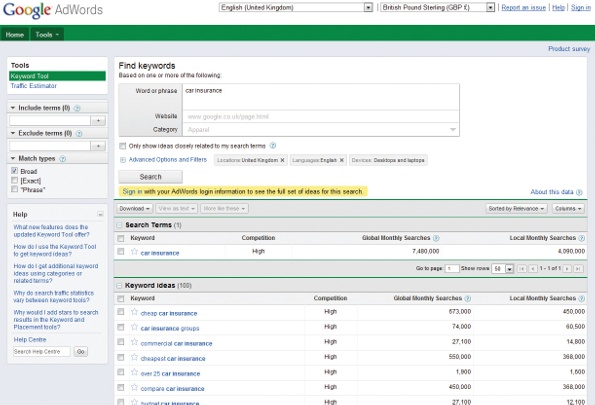
As this tool is freely available, it’s often the first port of call, even for professional SEOs. Note that the figures it produces aren’t always perfect and you’ll need to understand the difference between exact and broad match when doing your research, but on the whole it’s one of, if not the best keyword research tools available. Not to mention it’s from the search engine we all want to rank in!
2. KeywordSpy

One of the best ways to discover keywords is by analysing your competitors’. KeywordSpy provides a one-stop-shop for all manner of keyword research. You can easily spy on what your competitors have been optimising for and also what they’ve been bidding on for Pay-Per-Click (PPC) campaigns. PPC campaigns can often give you a great insight into which keywords convert well, as the competition will have tested this already for you! Alternatives to KeywordSpy include WordTracker and SEMrush.
3. Micro Niche Finder
4. Market Samurai
Both Micro Niche Finder and Market Samurai help you find niche and long-tail keyword opportunities. In Micro Niche Finder you can quickly analyse data from lots of different sources and see special keyword scores such as SoC (Strength of Competition) and OCI (Online Commercial Intention). The OCI value will tell you if people are looking to purchase something or are looking for information.
5. SimilarSites
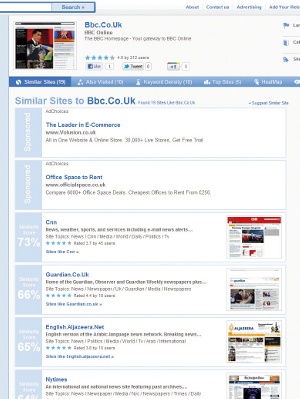
SimilarSites allows you to find websites that are similar to the one you’re looking to promote. The search results in Google will allow you to find most of your main competitors, but perhaps some of your competitors are targeting different keywords to the ones you are…
By using this tool you can find lots of competitors and then research them to find out what keywords they’re optimising for. A simple idea, but very useful.
Sign up to Creative Bloq's daily newsletter, which brings you the latest news and inspiration from the worlds of art, design and technology.
6. Google AdWords
If you’re promoting a brand new website or a website which hasn’t seen much traffic in the past, consider spending some money on Google AdWords so you can test how keywords convert quickly. There’s nothing worse than promoting a keyword for six months to end up finding it doesn’t convert very well! SEO is all about testing to see what works and keyword research is no exception.
7. Google Analytics
Rankings are all very well and good, but as SEOers we need to remember the end goal, and that’s making money! So although we may have the positions, we need to know if they’re converting and how much money they’re making if doing online payments.
By using Google Analytics goals and ecommerce tracking we can see everything we need to know and adjust our SEO campaign over time as we determine which keywords perform the best from a business perspective.
If you are looking to improve your SEO for an existing website you can learn a lot from your Google Analytics. It enables you to pull out keywords that have driven traffic to the website historically, and if goals or ecommerce tracking is set up you’ll be able to see which keywords actually convert into sales and leads.
Optimise your site
Once you’ve determined the keywords you want to target, you need to move on to optimising your website’s content and code. The way you structure your site and the content you place on it helps Google determine what it thinks your site is all about. But there’s a lot to check, especially if you have a dynamic site with thousands of pages. You want to make sure keywords are targeted correctly and that there is nothing getting in the way of Google when crawling your website. The following tools can help you out.
8. Xenu Link Sleuth
This amazing free tool crawls your website in a similar way to Google and quickly finds broken links and other problems. Can all your web pages be found? Maybe they’re too many clicks away? With Xenu Link Sleuth you’ll be able to see a good overview of your website’s pages and fix or improve them. Try to get in the habit of running this tool on any new website you create as it can help pick up simple mistakes that could be embarrassing later down the line.
9. Google Webmaster Tools
Again another free tool, Webmaster Tools gives you important feedback about your website from Google itself. You can also configure your website by adding a Google Site Map and setting a preferred domain, and see diagnostics for your website, which include crawl errors and HTML suggestions.
10. Google PageSpeed Tool
The speed of your website can have a big influence on your rankings, so Google has provided this free tool to measure it, and provides lots of great tips on how to improve things too. Some simple tweaks to your website can make all the difference here and you’ll be making your website visitors happy too!

11. SEO Powersuite - Website Auditor
A paid tool, Website Auditor is very comprehensive. It at first seems very similar to Xenu, but takes things a lot further and offers simple-to-follow reports for improving your website’s on-site SEO. It also caters for the internal linking of a website and can help you find ways to boost the page rank of pages you feel need more prominence. It will also help you optimise the content of your website and includes tools to analyse what your competitors are doing.
12. SEOmoz
Probably the best and most well known SEO website/toolset around at present, SEOmoz is found all over the place and for two good reasons. First, it combines great resources and tools to create an awesome place to learn and improve your SEO knowledge. And second, it has a rather cute looking ‘Roger the Robot’.
One of the main differentiating factors from other all-in-one SEO tools is that SEOmoz offers amazing resources, training and tips. And if you still need help there’s the Q&A system where you can ask a professional SEO any question you like.
There are also SEO Webinars where pro members connect directly with the experts behind SEOmoz. Each Webinar lasts for an hour-and-ahalf and is based upon a specific SEO or online marketing topic.
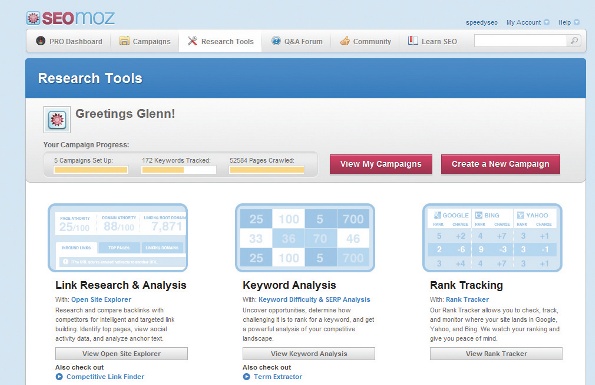
Pro members can ask their own questions at the end and you can watch previous Webinars too.
If you want to know more about a website’s backlinks and are missing Yahoo Site Explorer, then SEOmoz offers Open Site Explorer (OSE). This will help you compare your website’s popularity not only in terms of backlinks, but also social mentions and SEOmoz’s own Domain Authority and Page Authority metrics.
Finally there’s the SEOmoz community. It’s not only SEOmoz employees who contribute to the SEOmoz website: their users also regularly write in the YouMoz blog, a place where anyone can write an SEO article on a subject they are passionate about and receive comments from other users. Some very interesting topics pop up, and every now and then the SEOmoz team like a post enough to promote it to the main SEOmoz blog.
If you’re looking to learn or improve your SEO, you can’t go far wrong here.
LinkBuilding
There are many websites that offer linkbuilding services in return for your hard earned cash, but that’s not what this list is for. Instead, we’ll assume you’ll be doing your own link building and will be looking for quality links from trusted websites.
The main tasks for linkbuilding are identifying link prospects and implementing outreach to build relationships with the ultimate goal of securing a link. There’s a lot of information to keep track of and the following tools will help make it a lot easier for you.
13. MajesticSEO
MajesticSEO crawls the internet much like Google’s own spiders and indexes it all in its own database. With this massive database MajesticSEO is able to provide extremely useful data about your site and your competitors’ sites.
Want to know all the links a competitor has? no problem! Simply run off a quick report and you’ll soon have everything you need to know.
The Competitor Links tool can help you find links that you can also acquire. It can also help you analyse the techniques your competitors are using and find out why they’ve got the number one position and you don’t. Maybe they’ve been doing more article directory submissions, or maybe they’ve been doing something naughty like paying for do-follow links? You can dig into the data and find out all sorts of useful information.
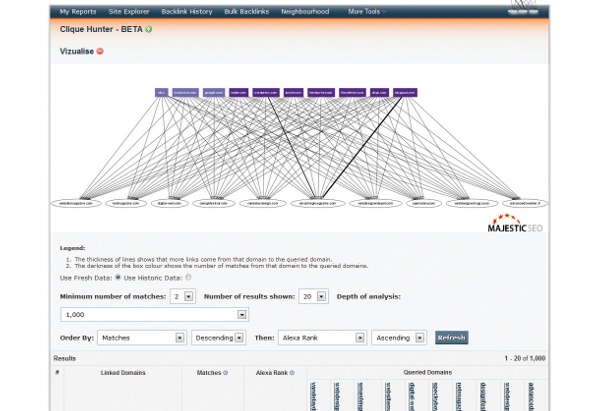
Another great aspect of MajesticSEO is the Backlink History tool, which enables you to chart the discovery of backlinks over time for multiple websites. This is great for seeing how much SEO effort your competitors are putting in and comparing it to how you’re doing. If you’re down in links per month, then you need to get working!
You may wish to know if your web server is in a bad neighbourhood (you don’t want your website being tarnished with the same brush as other spammy websites). Using MajesticSEO’s Neighbourhood tool, all you need to do is enter your domain or IP address and it will provide you with a list of other websites on the same IP address or nearby, which you can then visually check. If you see lots of spammy websites then it might be prudent to consider changing your hosting provider.
MajesticSEO also includes a great tool called Clique Hunter, which can analyse the backlinks of several sites at once. You can use this to report on your site and your competitors at the same time and then identify which links your competitors have that you don’t while filtering out the ones you already have.
Finally the Majestic Million tool lists the top one million websites. This can be used to find authoritative link prospects – or you can simply bask in your glory if you find your website on the list! Interestingly the top three websites at the moment are google.com, facebook.com and adobe.com.
14. Ontolo
Ontolo’s primary function is to help you find relevant and quality link prospects. You let Ontolo know the keywords you want to target and it will scour the internet and come back with lots of prospectives for you, all categorised by their type. You can then search these link prospects to find suitable link opportunities for your campaigns. For example, if you’re looking to do guest posting you can find sites that are likely to accept guest posts and exclude pages from your competitors or sites you have already engaged with.
15. BuzzStream
Trying to keep on top of all the outreach you’ve done via email, telephone, Twitter and so on can be an enormous task. You can end up with such massive Excel sheets containing all the contact information and reminders to follow up with people that some never get actioned.
BuzzStream solves this problem nicely with a custom online solution that enables you to keep all information in one place and categorise by website and campaign. It also enables you to send emails directly from the system and will collect replies and automatically add them into the contact history.
Plus it can help with link prospecting by automatically finding new websites to connect with every day. If that’s not enough, it will also do project management and handle tasks for your different team members and track your links to see if they’ve gone live, or been lost.
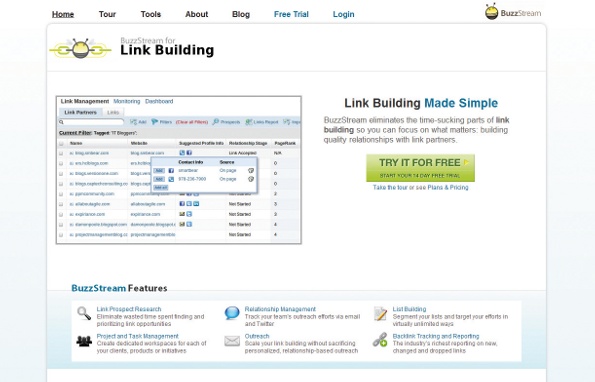
Social media
Online social activity has been proven to influence search rankings and it’s now becoming more commonplace for social media to be included in SEO campaigns. Although nowhere near as important as link building, those Facebook Likes and Twitter tweets can make a difference.
16. SproutSocial
A company can have so many social media profiles these days – with the likes of Facebook pages, Twitter accounts, Google Plus and LinkedIn – that it can be difficult to keep on top of them all. Enter SproutSocial, a tool that provides complete social media management. With SproutSocial you can easily run campaigns to promote your offerings and engage with your online communities.
17. Klout
Klout gives us insight into how influential your social media presence is across multiple social media platforms, including Twitter, Facebook and Google Plus. But the main advantage to an SEO campaign is using Klout to find influential profiles that match your required criteria.
Tracking and analysis
Fundamentally, SEO is all about testing. You want to know if what you’re doing is working and if you can better it. So monitoring your results over time is extremely important. you’ll want to monitor everything from your rankings on Google to how much money you’re turning over.
18. Searchmetrics Suite
Searchmetrics does overall paid and organic search visibility on all keywords. Track your website’s positions on search engines each day. You can then easily report on how your website’s positions are improving (or declining) and compare them against your competitors. Having access to this data is a powerful tool in trying to understand which of your SEO activities are producing positive results. Trying to manually track positions for lots of keywords is very difficult and time consuming, so this is one thing you’ll definitely want to find a tool for.
Management
Trying to manage an entire SEO campaign can be a daunting and difficult task, especially if you have an SEO team all working on a project at the same time. You can consider project management tools such as Microsoft Project or BaseCamp, but why not use something specifically built for the job?
19. LinkDex
The LinkDex platform is made up of many different features. The first main feature is the SEO task and project manager. This simple to use, but very effective, project management area enables you to assign tasks to different team members and easily report on them. LinkDex provides some sample task lists to get you started and you can, of course, make your own. The other great feature is that you can track ranking changes against completed tasks.
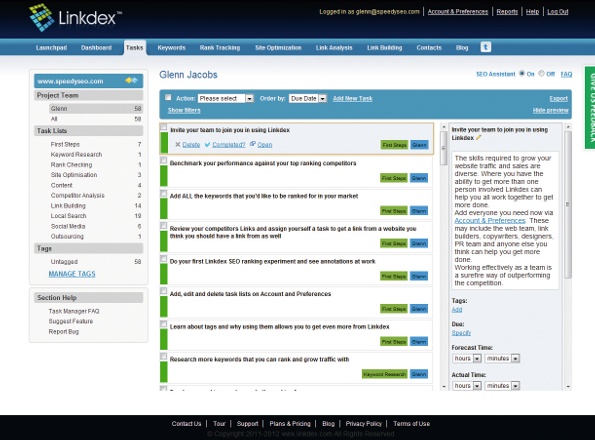
The next set of features helps you with your SEO tasks. There’s a backlink analysis system that will help you work out where you’re lacking in backlinks when compared to your competitors and there’s a website optimisation system that will score your pages and suggest improvements. LinkDex provides some great analytics also, with a fully fledged keyword rankings checker where you can compare how you’re doing against your competitors. And finally, you can create and export lots of reports in different formats. Great for monthly client reports.
20. Raven Tools
Raven Tools is a one-stop-shop for your SEO tool needs. The list of tools it includes is so long we couldn’t possibly mention them all here! You can use research tools, contact managers, keyword managers, use data from your Google AdWords campaigns, grab Google Analytics data and even access the system via their own free iOS app.
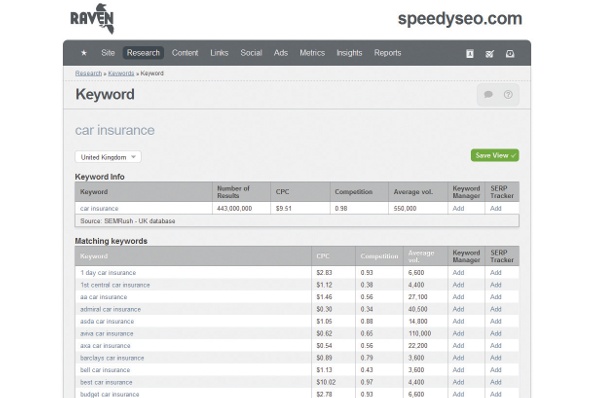
It also caters well for different user types. You can give users only the access they need and assign them tasks with little effort, allowing you to fully manage your SEO campaign.
There are also social media tools, content management tools and third-party connections to systems such as BaseCamp and MailChimp.
Words: Glenn Jacobs
Glenn Jacobs is a web developer and managing director of Neon Digital, which delivers premium and innovative branding, web design, web development, digital strategy and marketing solutions. This article first appeared in issue 226 of net magazine.

The Creative Bloq team is made up of a group of art and design enthusiasts, and has changed and evolved since Creative Bloq began back in 2012. The current website team consists of eight full-time members of staff: Editor Georgia Coggan, Deputy Editor Rosie Hilder, Ecommerce Editor Beren Neale, Senior News Editor Daniel Piper, Editor, Digital Art and 3D Ian Dean, Tech Reviews Editor Erlingur Einarsson, Ecommerce Writer Beth Nicholls and Staff Writer Natalie Fear, as well as a roster of freelancers from around the world. The ImagineFX magazine team also pitch in, ensuring that content from leading digital art publication ImagineFX is represented on Creative Bloq.
